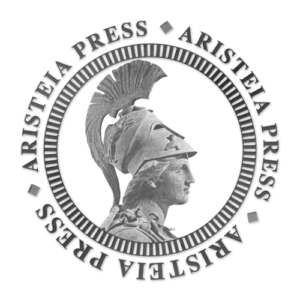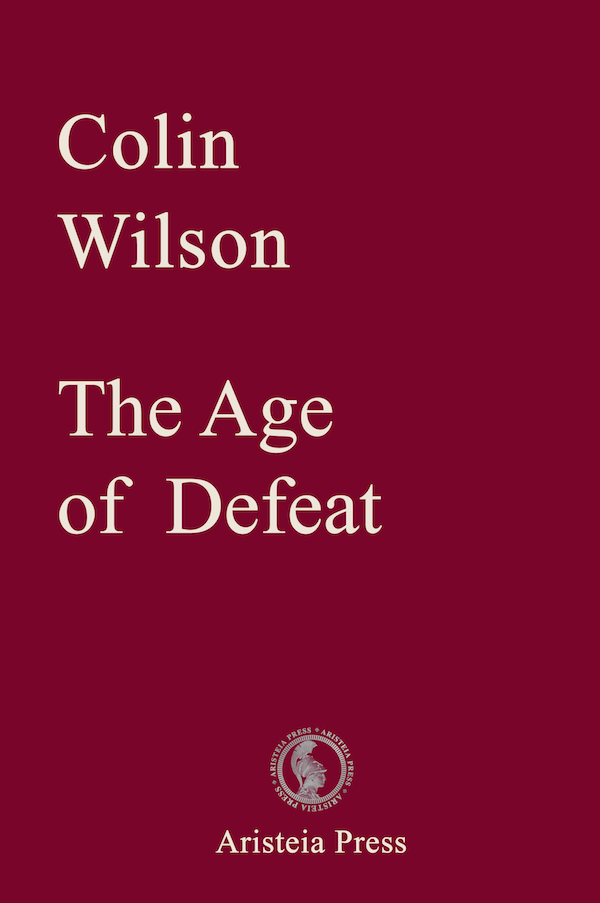“What is most interesting about Zarathustra is Nietzsche’s realisation that the real hero must be a perfectly healthy man.”

“The old hero was the favourite of the gods; the new hero aims at becoming a god. Riesman would say that the old hero was ‘tradition-directed’, while the new hero aims at being completely inner-directed.”

“If it is a mental attitude that has created the problem, then it will be a change of attitude that will be the first step in solving it. ‘Insignificance’ is a literary trend that can be combated.”

“This points to one of the main causes of the failure of French existentialism. It has failed to place sufficient emphasis on the creative drives. It deifies the ordinary at the expense of the extraordinary. One might adapt Shaw’s comment on Shakespeare, and say that it understands human weakness without understanding human strength.”

INSIDE THE AGE OF DEFEAT
PUBLISHER’S NOTE TO COLIN WILSON’S THE AGE OF DEFEAT
“The highest compliment Shakespeare’s Anthony could pay Brutus was:
‘This was a Man.”
Colin Wilson
The Age of Defeat
We could not have chosen a better time to publish this book. The Age of Defeat is about the loss of the hero in Western culture and the implications of that loss for humanity – for us. When it was written in the middle of the 20th century, it was the idea of the hero that was endangered. Today it is Man, his identity and his masculinity, who is verging on extinction. The concept of Man is one of the most ambiguous and puzzling in our culture. It might be a good moment to remember what to be a Man used to imply.
Today, the word Man just makes reference to a male, but in the past it comprised a list of virile attributes. The Latin word “Vir” meant Man and also hero because Man and hero have evolved together throughout history. Words with the same root, like vigour, virility and virtue were traits exclusively connected to Man. Virtue for example, comes from “virtus” and it was used to describe qualities attached to men, such as excellence, character, courage, worth and strength. It is these qualities that have got us from hiding in caves to walking the moon. Let us not forget that 99.9% of the creations we enjoy are the fruit of Man’s labour, effort, intelligence, sacrifice, ambition, courage, enthusiasm and tenacity. And yet we are suffering from the most serious crisis of masculinity in history, a crisis that in recent years has reached epidemic proportions.
‘Let us not forget that 99.9% of the creations we enjoy are the fruit of Man’s labour, effort, intelligence, sacrifice, ambition, courage, enthusiasm and tenacity. And yet we are suffering from the most serious crisis of masculinity in history, a crisis that in recent years has reached epidemic proportions.’
An epidemic is “a contagious disease that over a period of time infects a large number of people simultaneously and in the same area”. It is also “a misfortune that grows out of control.” The whole world is sick, including Man himself, because not even he seems to appreciate who he is or the magnitude of his achievements and, worse still, what he might yet accomplish. And if we do nothing, if we allow the epidemic to spread, and we permit radical feminists and feminized men – those who, according to Wilson suffer from “an acute form of the insignificance fallacy” – to spread their slander against Man, then Man could end up being a memory from the past. Man would have perished, not due to evolution, but to an ideological campaign to annihilate the virtues associated with him. We need to be very careful because when a country, culture, race or religious group points to “something or someone” as the enemy, when they demonize it, there are all too many reasons to destroy it. We already know many examples.
Man is not perfect. He has committed unforgivable atrocities, but he is responsible in his own right both for the good and the evil of this world. The problem today is that the good things are taken for granted; as if everything we posses wouldn’t have required anyone’s hard work. As if the infrastructures and the cleanliness we enjoy, indispensable advancements that set us free from a gruelling existence, or the development of technology and the astonishing medical advances that save us from the threat of constant danger or premature death, had not only created themselves but had nothing to do with his efforts. We forget that we are standing on the shoulders of giants!
Nobody knows better than Man what it means to be a hero. It is in his nature. Like every legendary creature, Man has forged himself throughout history by facing fabulous challenges, full of dangers and setbacks, of betrayals and mortal wounds. The battle he is facing now is different, however. It is a psychological battle. And although it might seem less dangerous, it shouldn’t be taken lightly, because what is at stake here is the basis of his very being. The enemies Man has to face are not invaders from another country although in their cultural values and their religious orientation they differ strongly from him. They are in his own home, in his workplace, among his circle of friends and relations. The enemy is the whole world, and when I say “whole” I mean everybody, because the most bitter and hardest adversary is inside himself. To fight this war against masculinity he won’t need a spear and shield, but the kind of wisdom, insight and assurance only some books can provide. Victory will be convincing himself that to be a Man is an honour – a conquest, not a right.
The Age of Defeat is a sound book, one that addresses us as adults and impels us to look at ourselves and identify without concessions what we have done wrong. But it is also a book that reminds us who we are, what we are capable of and where our power lies. It presents us with a new way of thinking and being in the world. Colin Wilson introduces his New Existentialism as the basis for the revolution in thought that we need to bring about; a revolt against insignificance and ordinariness. The New Existentialism is a practical and strong-willed philosophy that will renew the concept of Man as hero. It emphasises the extraordinary in us. Because to find his sense of purpose and to restore confidence in his own spirit, Man will need to believe in Man again, and include in his life words like heroism, greatness and power. What will emerge from this crisis will be a new Man who will embody heroic and full-blooded masculinity. This time the transformation will not take place through social, political or religious dogma, but via personal discipline and self-reliance.
‘Colin Wilson introduces his New Existentialism as the basis for the revolution in thought that we need to bring about; a revolt against insignificance and ordinariness.’
The world is turning into a playground. We need men who take their model in Man. Without them life is too effeminate, too soft, too shallow. We need heroes to brighten up our lives with their backbone and their honesty, with their protective strength and their lucid intelligence. Women cannot cope with the world by themselves. They need men too, even though some might not be aware of it. It is a fact that to raise men, men are needed and whether we like it or not, only men can be men, because only they are equipped by nature to fill the gap.
Samantha Devin
Samantha Devin is the publisher and co-founder of Aristeia Press. She is the author of the novels Bilis Negra, Arcadia and Heroica. As a playwright she has written MEN, The Great Pretender, and Topophilia.


